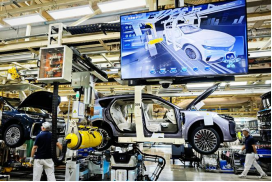As the automotive industry enters a new phase of intelligent competition, key technologies are placing greater demands on enterprises’ R&D and implementation capabilities. At the 2025 New Energy Intelligent Vehicle High-Quality Development Forum held on July 15 (hereinafter referred to as "the Forum"), several industry experts pointed out that the trend of intelligentization is calling for new types of collaboration across the automotive value chain, prompting companies to explore innovative modes and mechanisms of deeper cooperation.
Wang Jianqiang, Dean and Professor at the School of Vehicle and Mobility at Tsinghua University, stated at the Forum that due to China’s complex traffic scenarios, enhancing road traffic safety has become a national priority — and intelligent vehicle technology is a key tool in achieving this goal.
“Lower-level intelligent vehicles have already achieved significant market penetration and large-scale industrial application,” said Wang. “However, as we move toward higher levels of autonomous driving, there are still many technological challenges that need to be overcome.”
Intelligent technology has become one of the core battlegrounds in the automotive industry. Zhang Yongwei, Vice Chairman and Secretary-General of the China EV100, noted that global automotive competition now revolves around intelligentization. New intelligent technologies are prompting closer integration between OEMs and component suppliers, imposing new requirements on collaboration across the value chain.
“As automotive competitiveness shifts toward intelligence and AI, enterprises need to explore new development models,” Zhang explained. “Many automakers are choosing to collaborate with tech companies to address their shortcomings in intelligent capabilities. In this new era, cross-industry cooperation is becoming a crucial external source of competitiveness for automakers. Software, chips, and data ecosystems beyond the traditional auto industry are now deeply integrating with it, driving upgrades across the sector.”
Ma Cuibing, Board Member of JAC Group Holdings and Deputy General Manager of JAC Motors, shared his company’s experience of cross-industry collaboration with Huawei.
“In this new era of automotive development, building and nurturing new capabilities requires empowerment and cross-boundary cooperation,” Ma said. “We’re engaging in comprehensive strategic collaboration with Huawei Digital Energy across key areas such as NEV model/platform technology development and application. At the same time, we are benchmarking against Huawei to drive organizational reform and capability enhancement.”
Cooperation across the value chain is also supporting the Chinese auto industry’s global ambitions. Gu Jianmin, CTO of Valeo China, told reporters that China’s automotive industry has made great strides not just in market scale but also in technological advancement.
“Software is becoming increasingly influential in automotive products, transforming cars from mechanical products into integrated hardware-software systems,” Gu said. “As a result, more Chinese automakers are now providing technologies to overseas manufacturers. China has become the ‘fitness center’ of the global auto industry, and we will continue increasing our investment in China.”
“Globally, China’s automotive intelligentization has reached a deep-water stage,” said Lu Donghai, Deputy General Manager of Automotive Electronics Marketing at ZTE Microelectronics. “We hope that under policy guidance, automakers and ICT enterprises can be brought together in an orderly way to promote innovation through ecosystem integration. We also hope Chinese automakers can take the lead and mobilize the entire value chain to collectively drive the continuous upgrading of the country’s automotive industry.”
From chip development to intelligent driving, from innovations in electrical/electronic architecture to software-defined vehicles, China’s auto industry is forging a uniquely Chinese path through continuous exploration of new collaboration mechanisms within the industry chain.
“In the future, the auto industry must adopt a more open model to access a broader range of intelligent capabilities,” Zhang Yongwei added. “Automakers need to seamlessly connect with companies specializing in computing power and algorithms, internalizing these external resources into core competitiveness. Cross-industry integration will continue to inject vitality into the development of China’s automotive sector.”
Declaration: This article comes from Economic Information Daily.If copyright issues are involved, please contact us to delete.
